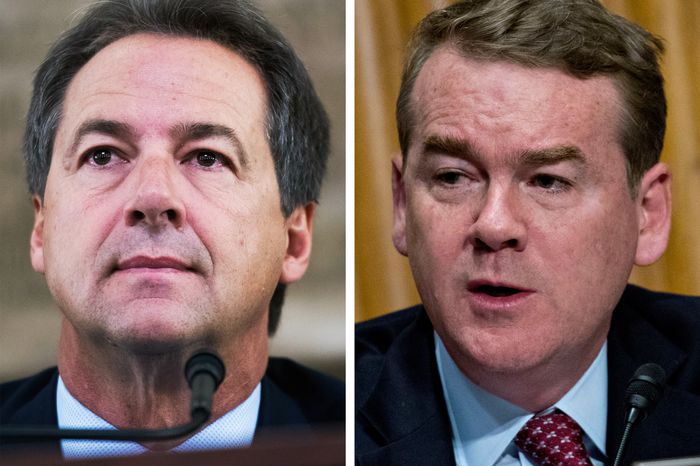
There are currently 20 announced Democratic candidates for president deemed “serious” aspirants. (That includes one candidate, Wayne Messam, who isn’t on some lists, although he is mayor of Miramar, Florida, which is larger than Pete Buttigieg’s South Bend). Now two others with solid résumés but little to no national name ID are joining the fray.
MTN News reports Montana governor Steve Bullock will announce his long-discussed candidacy “in two weeks.”
And on CBS this morning, Colorado senator Michael Bennet became the seventh U.S. senator in the 2020 field:
“My plan is to run for President,” he said on CBS, adding that he will focus on the lack of economic mobility in the country and restoring integrity to politics.
That’s right, two more white dudes joining ten others already in the field. They have other things in common: moderate reputations; Rocky Mountain time zone backgrounds and addresses; and good records as politicians in their home states. It’s unclear whether any of these attributes will matter much in a crowded field of candidates who all have head starts on these Westerners.
Bullock is probably taken more seriously among national observers, though his delayed announcement (he waited until his state’s legislature adjourned, and will wait a while longer while he deals with the gubernatorial task of signing and vetoing bills) may have squandered a lot of that interest. As Gabriel Debenedetti explained in a 2017 profile of Bullock, he’s a very good retail politician in a difficult state for his party:
One national-level Republican operative who has reviewed the GOP’s previous research on Bullock told me the party sees no obvious way to take him on, aside from the purely partisan appeal that hasn’t worked against him so far. A former D.C. lawyer, Bullock was elected to his first statewide office, attorney general, in 2008, when John McCain carried Montana by 2 points. Four years later, he became governor as Mitt Romney won the state by 13. He was reelected last November by 4 points, while Donald Trump won Montana by 21. Bullock likes to remind people that 20 percent of voters picked both of them.
Like Beto O’Rourke of Texas and Stacey Abrams of Georgia, Bullock rejected overtures from Chuck Schumer to run for the Senate in 2020. He set up a PAC that deployed staff in Iowa some time ago. But he will struggle to reach the polling or fundraising thresholds necessary to get him onto the debate stage for the first meeting of candidates in June. He also needs to find signature issues to distinguish himself, other than his ability to put together a relatively progressive record (including Medicaid expansion) in a place like Montana. He does have some background in fighting for campaign-finance reform.
Bennet also has a strong electoral background, winning his first full Senate term in the very strong Republican year of 2010 and being reelected by a comfortable margin in 2016. His background is mostly in education policy (he was superintendent of schools in Denver in 2009 when then-Governor Bill Ritter appointed him to the vacant Senate seat of Ken Salazar, who had become Obama’s secretary of the Interior), and he’ll probably need to distinguish himself in other policy areas.
There are three really unusual things about Bennet’s proto-candidacy, though. First, he announced not long ago that he had prostate cancer. But he’s since had surgery, and is indicating that his doctors gave him a green light to run. Second, he’s the older brother of New York Times editorial-page editor James Bennet, who announced this morning that he would recuse himself from involvement in any coverage of the 2020 campaign so long as Michael is in the race. And third, he was once chief of staff for another candidate already in the field, John Hickenlooper, when the former governor was mayor of Denver. They will inevitably overlap in fundraising networks and political associations in ways that will complicate life for both of them.
It’s unclear what path either candidate would have to the nomination. Iowa is not that distant, geographically or culturally, from either of them, but vastly better known and more popular candidates were there first (some, like Biden and Sanders, have been there in the past). Another early state, Nevada, is in the West, but its strong Latino and labor orientations will probably cater to others more easily. Bennet’s Colorado and another Rocky Mountain state, Utah, vote on Super Tuesday (March 3), but will be dwarfed by primaries that day in giants California and Texas. Bullock’s Montana doesn’t hold its primary until June. About the most either of them can hope for is a surprisingly strong if distant finish in Iowa followed by a rapidly winnowed field in which “electability” becomes a paramount concern. And even then it would be a reach.
It would be nice to be able to say definitively today that once Bullock and Bennet formally announce, the field will finally be complete. But unfortunately, New York mayor Bill de Blasio is still toying with a race, despite the notable lack of enthusiasm he has engendered for the idea at home and elsewhere. And Georgia’s Stacey Abrams, who would have some immediate support, has indicated she thinks she could launch a viable candidacy as late as this autumn, after the first two sets of debates. So the final, final Democratic presidential field isn’t set yet. But despite the growing diversity of the Donkey Party, it is clear white men will still be amply represented in the choices available to primary voters.






























